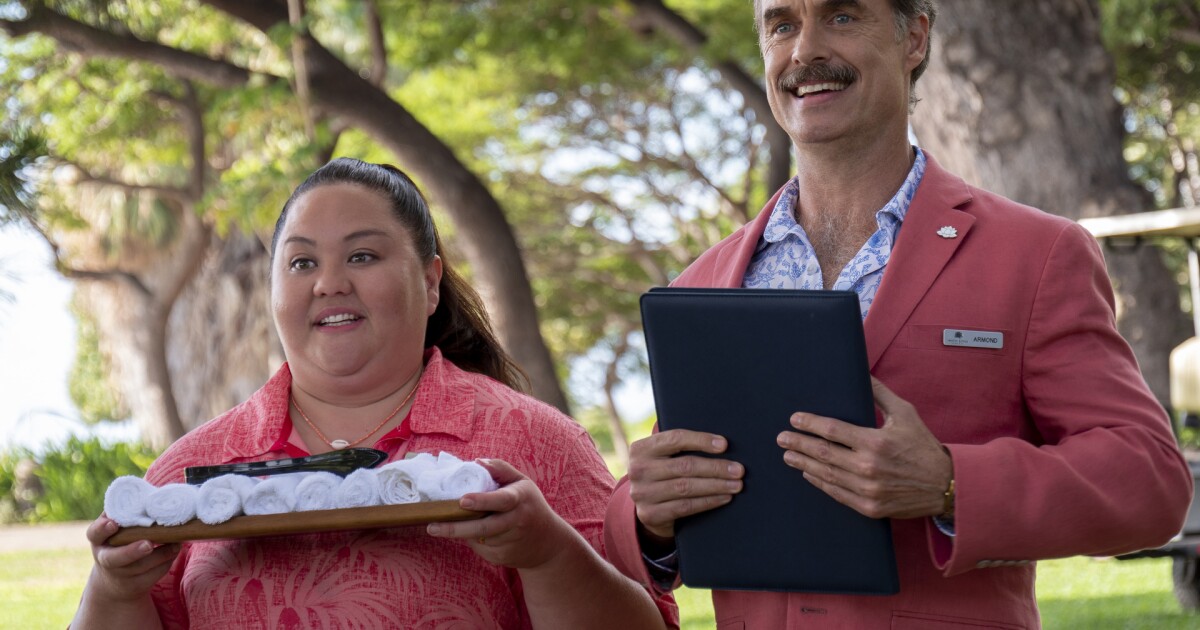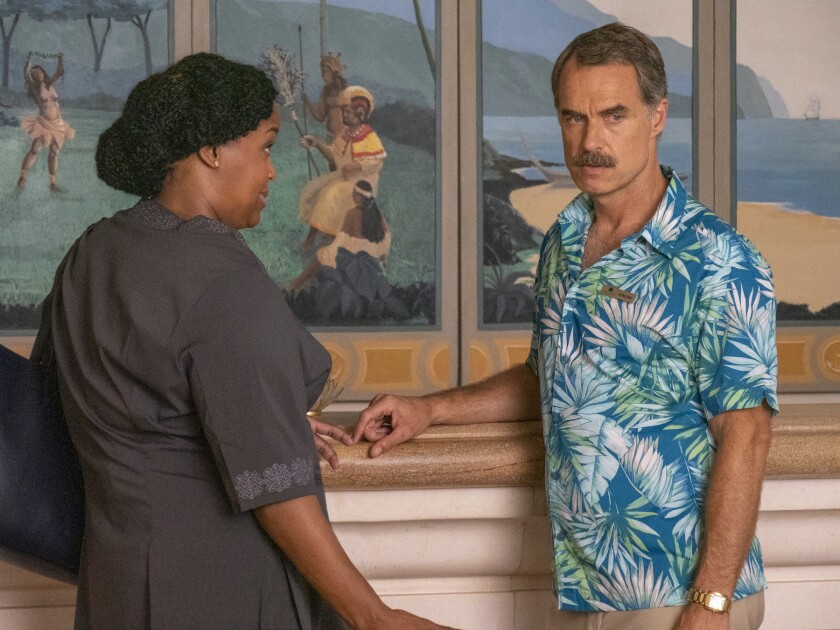‘White Lotus’ HBO: At its $ 9,000 / night ‘Hotel from Hell’
[ad_1]
At the Four SeasonsMaui, guests can all in one One bedroom suite overlooking the golden sands of Wailea Beach for about $ 9,000 per night private helicopter flight to an organic farm for $ 26,450 or drop $ 23,750 on a morning of whale watching.
But in late October, the high-end resort hosted an experience that was truly priceless: filming HBO’s “The White Lotus.” Amid a deadly COVID-19 surge and bitter presidential election, the cast and crew lived in a luxurious bubble in the hotel that reopened to begin production of writer / director Mike White’s dark satire, accompanying guests and staff at the fictional White Lotus Resort through a particularly lazy week full of microaggressions, mishaps, marital disputes and death.
Newsletter
The Complete Guide to Home Viewing
Get Screen Gab for weekly recommendations, analysis, interviews, and disrespectful discussions about TV and streaming movies that everyone is talking about.
You may occasionally receive promotional content from the Los Angeles Times.
In contrast to other shows about the ultra-rich, however, “The White Lotus†is anything but lifestyle porn: It shows a tropical retreat for the 1% as a seething cauldron of class conflict, environmental despair and white privilege – a place that you can can dissolve rather than relax.
“That feeling of apocalyptic fear – sometimes I feel it most when I’m on vacation,” White said in a recent telephone interview. “You go to these places where you are supposed to escape all the problems in the world and you find that you can’t really escape them. The discomfort you feel is almost exacerbated where you are supposed to feel so relaxed. “
The seeds for the series were sown last summer when White, who had locked himself in at home and pulled his hair off to watch CNN, received a call from HBO.
Hindered by pandemic production delays on several of its shows, the network needed programming to fill its line-up. They wondered if White – who has a reputation for writing fast – could develop a COVID-friendly show in a single location that could start filming as soon as possible.
The idea of ​​a hands-free development process particularly appealed to White, who doesn’t like the long wearing times that are typical of the TV business. “Maybe I can just go and do the show I want to do,” he recalled. White started writing in August and the cameras were on in late October. “Those were basically first drafts,” he said of the scripts.
White has always wanted to do a show about a couple on their honeymoon who suddenly realized they had completely different values ​​because “you just see people differently when you are on vacation,” he said.
Sydney Sweeney and Brittany O’Grady in a scene from “The White Lotus”.
(Mario Perez / HBO)
In “The White Lotus” Shane (Jake Lacy), a nightmarishly titled brother from a wealthy New York social family, comes to Hawaii with his beautiful bride Rachel (Alexandra Daddario), a freelance writer from a humble background. When the seriously wounded manager of the hotel, Armond (Murray Bartlett), mistakenly booked them a room without a plunge pool, Shane – to Rachel’s annoyance – becomes obsessed with getting into the coveted Pineapple Suite.
They are joined by the Mossbacher family at the resort, led by their mother Nicole (Connie Britton), a technical manager and “Lean In†company feminist. She is crammed into a one bedroom suite with her emasculated husband (Steve Zahn). ; her teenage son (Fred Hechinger), addicted to pornography; her performatively bright daughter Olivia (Sydney Sweeney); and Olivia’s best friend from college, Paula (Brittany O’Grady). Tanya (Jennifer Coolidge) also lives at the White Lotus. a needy heiress dumping her emotional baggage with compassionate spa manager Belinda (Natasha Rothwell).
White’s previous series, Enlightened, the critically-loved dramedy starring Laura Dern, examined a woman’s unworldly efforts to change a soulless business. In contrast, “The White Lotus†is about “getting into the mindset of the people who have money and power,†said White, “and why they are so defensive right nowâ€.
A palpable sense of fear creates the fact revealed in the series opening scene that someone at the resort will be dead by the end of the week.
“It’s kind of a trope at this point – the dead body at the top of the series,” said White, who is known for weird critical favorites like “Year of the Dog,” but also knows how to make mainstream fare like “School.” of Rock “writes.”
“I don’t usually have any bodies on my show,” he continued. “But I thought to myself, ‘Give people what they want: here is your corpse!’ And I think it helped create that ‘what’s going to happen?’ Feeling to stir up. So that there is a little more blood in the mouth than in a ‘California Suite’ â€, the Neil Simon comedy takes place in a luxury hotel.
White has a personal connection with Hawaii that dates back to his childhood vacation with his family. He bought a house in Hanalei, Kauai, after filming part of “Enlightened” there a decade ago, and befriended members of the Hawaiian sovereignty movement, which considered the annexation of Hawaii by the United States in 1898 to be illegal for determination rights similar to those of other indigenous groups.
Over time, White has come to understand the complexities of a place where tech billionaires buy vacation homes on holy land based on American imperialism.
“Hawaii is a very heavenly and idyllic place, but the more time you spend there, the more you realize how complex the story is and how vivid the story is – the colonial legacy is obviously still a living theme. “he said. Still, tourism – along with the military – is a major local economy, employing more than 200,000 people nationwide and attracting 10 million visitors as of 2019, according to the Hawaii Tourism Authority.
“It’s not a simple paradise postcard,” he added. “But I think there are a lot of tourists who go there and are not aware of the problems.”

Mike White, screenwriter and director of The White Lotus, pictured in Hawaii.
(Jason Yokobosky)
These tensions come to the fore in “The White Lotus,” mostly through Paula and her burgeoning romance with Kai (Kekoa Kekumano), an employee whose family claims hereditary rights to the land on which the hotel stands. Paula goes on vacation “expecting just to have fun and do drugs” while reading Judith Butler by the pool, O’Grady said. But her perspective changes over the course of her week as an elite invader and seemingly the only colored person staying at the White Lotus.
“She goes this line where she can have a nice vacation with her friend, but she is not one of them. She can sit at the table, but the world sees her differently, â€said O’Grady.
Paula bites her tongue over long, excruciating meals when the Mossbachers complain about the alleged riots by #MeToo and the humiliation of having to prove their “anti-racist bona fides” – circumstances that O’Grady, who is biracial, faces , is deeply connected. “I’ve been to so many dining tables where people just say things and you ask, ‘What?'” She said. “I’m black, but a lot of people don’t see me as a black woman. I sometimes have the privilege of going into rooms, but then I’m still affected by anti-blackness. “
In the fourth episode of the series, “Recentering,” Paula is upset when she watches a bare-chested quay perform a traditional dance for the hotel’s rich, white clientele – including the Mossbachers, who seem unfazed by the spectacle.
“She sees how tourism has affected his life every day, and she doesn’t think Olivia” – who jealously flirts with Kai – “was raised by people who are aware,” said O’Grady.
White and a team of producers arrived in September to begin preparations and received a standing ovation from the Four Seasons cast staff and the crew were tested for COVID three times a week and their movements were severely restricted.
Everything was filmed on site in the hotel, in guest suites that were remodeled by production designer Laura Fox. White, who directed all of the episodes, filmed the resort from unusual angles to create a sense of discomfort rather than serenity. A hypnotic film music by the composer Cristobal Tapia de Veer adds to the atmosphere of impending doom.
The result is not exactly an advertisement for luxury tourism.
“You were excited for the deal,” White said of the Four Seasons. “But that this is now the picture for the hotel from hell escaped them to some extent.” (A representative of the Four Seasons Maui politely declined to comment on the show and its portrayal of the tourism industry.)
After several weeks of filming, external guests began to break into the Four Seasons. Some weren’t happy to share their vacation with a TV production, creating a situation where the cast and crew did some class satire while watching the real development between takes.
“It was fascinating to see some of the characters from the show among the resort guests,” said Bartlett. His character is one of the few white employees at the resort and initially the figurehead for the dehumanizing aspects of the service industry. (White said he cast Bartlett because the actor was “so in front of the house” and his Australian accent sounded “posh” to American ears.)
When we first meet Armond, he teaches a new employee – a native Hawaiian who hides her pregnancy for fear of losing her job – about suppressing her individuality in order to be a “pleasant interchangeable helper.”
White said he is trying to show how our identities are defined and in some ways perverted who has the money. People who work are less able to be themselves than the people who pay the bills. “
But the Pineapple Suite snafu sends Armond off the car, who is in recovery, and his submissive facade quickly gives way to years of pent-up resentment. “The more he tries to hold his grip, the more he slips away as these people get more and more disgusting,” said Bartlett.
Natasha Rothwell and Murray Bartlett in a scene from “The White Lotus”.
(Mario Perez / HBO)
Bartlett clung to a relatable biographical detail that was ultimately deleted from the series: Armond once aspired to be an actor. “We see his world for a week. Imagine working in this world for a few decades while dealing with your shattered dreams, “said Bartlett, who, like many actors, has hospitality experience.
The topic of “The White Lotus†also made everyone involved in the series aware of how to deal with the resort’s employees.
“They were really understaffed with COVID and when I picked up the phone to call the front desk to say, ‘I left my laundry three days ago, where is it?’ I thought, ‘Oh my god, what an ad!’ Said Bartlett. “We’re all these characters at some point.”
White also felt contradicting himself: “You want to be that cool guest who is not into ceremonies, but who often comes across as condescending. As much as you want to break down the barriers that money and power can create, there is always a reality. Sometimes you just can’t transcend these roles. “
[ad_2]


